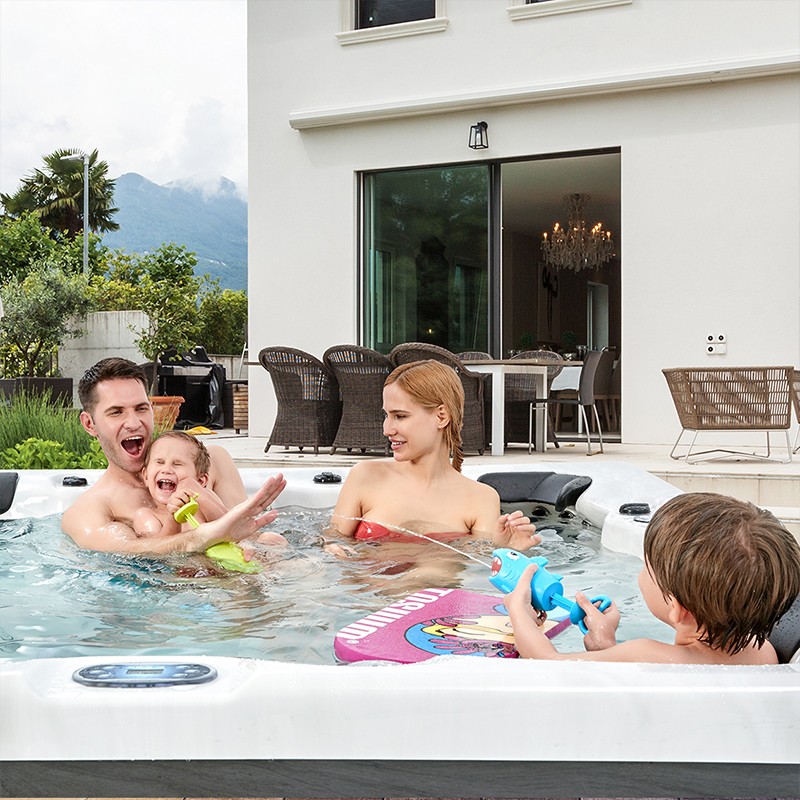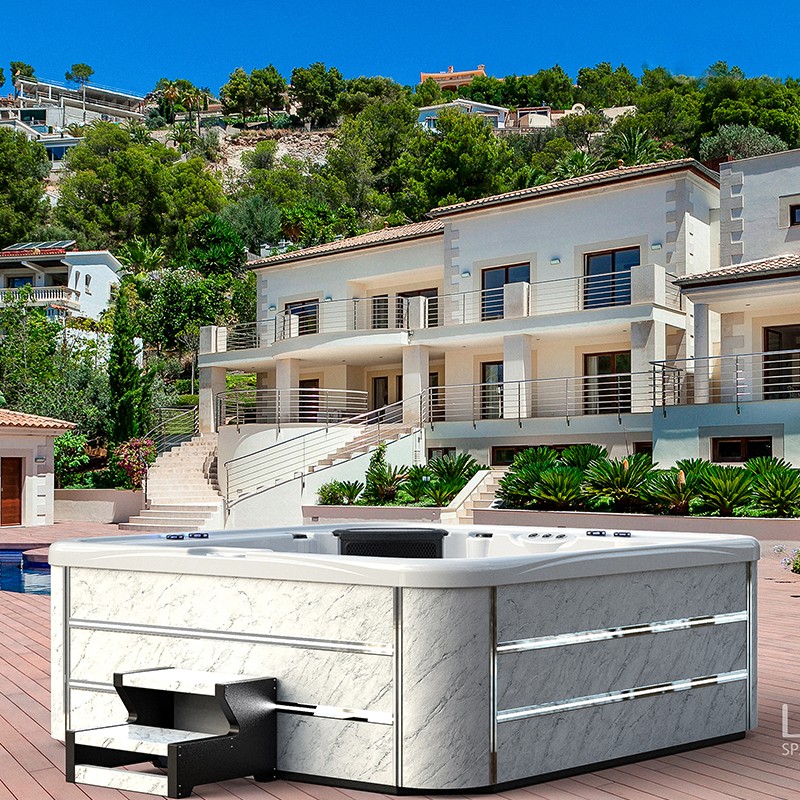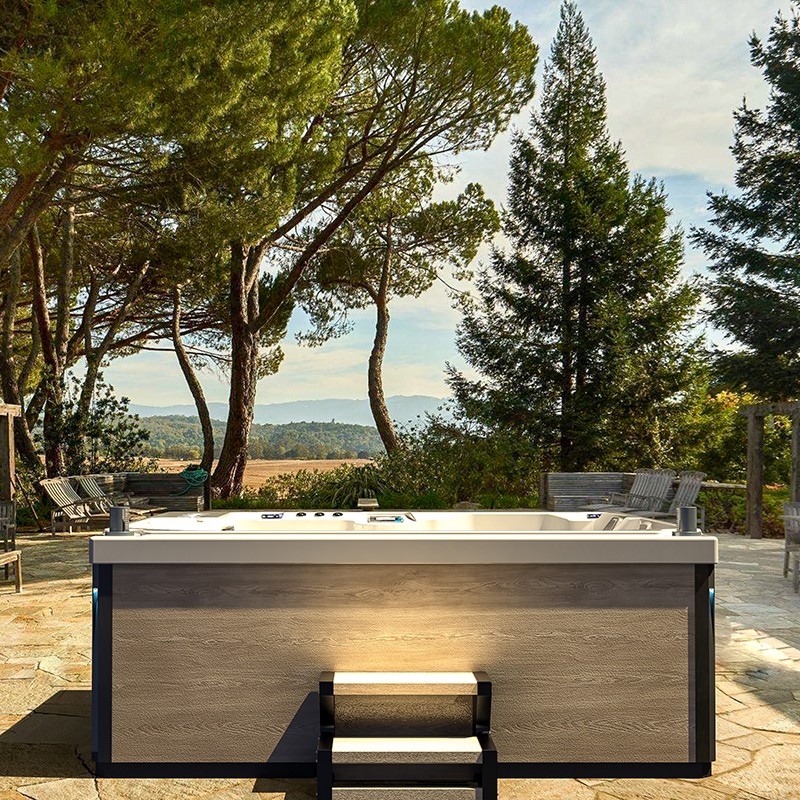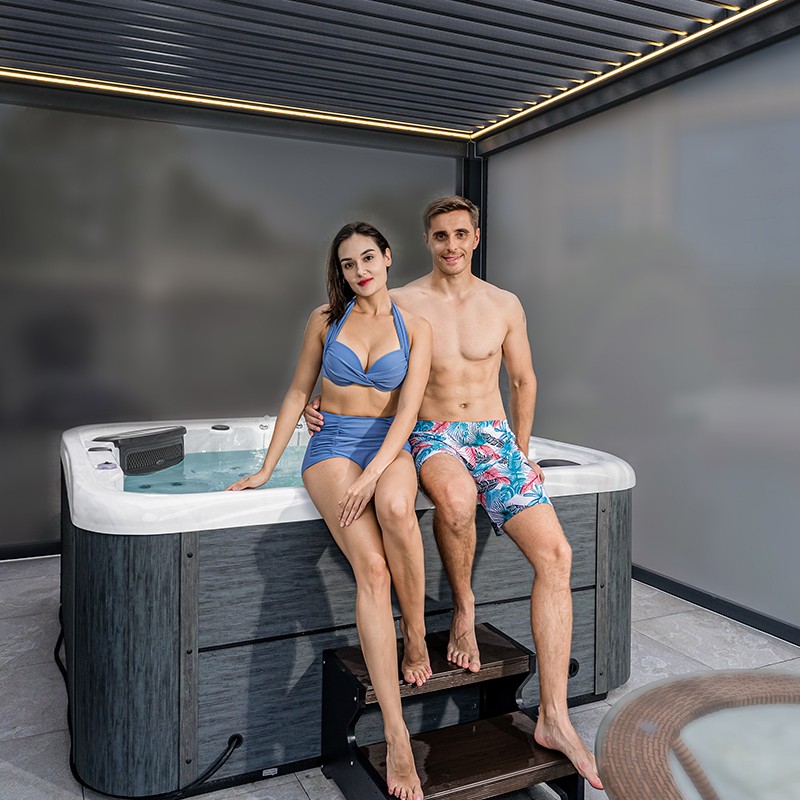
How to adjust the water hardness in an outdoor spa jacuzzi tub?
2025-08-16 15:30Outdoor spa jacuzzi tubs are not only ideal for relaxation, but also a vital leisure feature in many homes. However, as with all water systems, managing the water quality in a spa jacuzzi tub is crucial, particularly water hardness.
Water hardness, generally referring to the concentration of dissolved calcium (Ca²⁺) and magnesium (Mg²⁺) ions in water, directly impacts tub water quality, equipment maintenance, and user experience.
Excessive water hardness can lead to scale accumulation, affecting water flow and heating system efficiency; while low water hardness can increase water corrosivity, damaging the tub and plumbing. Adjusting the water hardness in an outdoor spa jacuzzi tub is a skill every tub owner needs to master.
This article will detail the impact of water hardness on an outdoor spa jacuzzi tub, including how to test and adjust water hardness, as well as key considerations when adjusting water hardness. This will help users effectively maintain tub water quality and extend the life of their tub.

How does water hardness affect an outdoor spa jacuzzi tub?
1. What is water hardness?
Water hardness refers to the concentration of calcium and magnesium ions in water, typically expressed in "ppm" (parts per million) or "mg/L" (milligrams per liter). Water can be categorized as either soft or hard, depending on the degree of hardness.
·Hard water: Water has high concentrations of calcium and magnesium ions, typically exceeding 120 mg/L.
·Soft water: Water has low concentrations of calcium and magnesium ions, typically below 60 mg/L.
The impact of water hardness on an outdoor spa jacuzzi tub is primarily manifested in the following ways:
·Scale accumulation: The calcium and magnesium ions in hard water react easily with substances like carbonates in the water, forming scale, which is particularly noticeable in hot water. Scale accumulation not only affects water flow and heating system efficiency, but can also clog pipes and even damage heating elements.
·Equipment corrosion: Soft water contains fewer dissolved minerals, but is more corrosive. Long-term use of soft water can cause corrosion to metal components in bathtubs, pipes, heaters, and other equipment, shortening their lifespan.
· Unclear Water Quality: When water hardness is too high, mineral deposits in the water can cause turbidity, affecting the clarity of the bathtub water and diminishing the user experience.
2. Impacts of High Water Hardness
The biggest problem with using hard water is scale accumulation. Scale not only affects the performance of the outdoor spa jacuzzi tub and water flow system, but can also reduce the efficiency of the heating system. Due to the high water temperature in a spa jacuzzi tub, scale easily forms on the heating element, resulting in poor heat transfer, increased energy consumption, and shortened equipment lifespan. Scale accumulation in the heater can also cause equipment failure and increase repair costs.
Another problem with hard water is that scale accumulation can clog filters and pumps, reducing water circulation efficiency, ultimately affecting water quality and smooth water flow. Prolonged use without removing scale can cause the entire water circulation system to malfunction.
3. Impacts of Low Water Hardness
While soft water does not form scale, it is highly corrosive. Soft water, with its lower mineral content, tends to extract metal components from fixtures more easily, causing corrosion to metal parts like pipes, tub surfaces, and heaters, potentially accelerating fixture aging. Soft water is particularly corrosive in high-temperature environments.
Soft water can also cause the tub surface to become sticky, making it difficult to clean and maintain. Spa jacuzzi tubs using soft water may also accumulate more stains and grease, making them difficult to remove and affecting the user experience.

Outdoor spa jacuzzi tub: How to test water hardness?
To adjust the water hardness in an outdoor spa jacuzzi tub, you first need to determine the current water hardness. There are several common methods for testing water hardness:
1. Using a water hardness test kit
A water hardness test kit is a common and simple method for home users to test the water quality of their outdoor spa jacuzzi tub. These kits typically contain a liquid reagent or test strips that react with the water sample to change color, indicating the water hardness. To use:
· Take a small sample of tub water.
· Add the reagent or test strips to the water sample according to the instructions.
· Comparing the test results based on the color change or reagent reaction yields a water hardness value. Common units are ppm or mg/L.
This method is simple and inexpensive, but its accuracy is slightly lower than laboratory testing.
2. Using a Digital Water Quality Tester
For more precise measurements, digital water quality testers are a more advanced option. These devices use electronic sensors to detect the concentration of calcium and magnesium ions in the water, providing an accurate water hardness value. Digital water quality testers offer the advantages of high accuracy and rapid response, but are generally more expensive.
3. Laboratory Testing
For outdoor spa jacuzzi tub owners seeking the most accurate water hardness data, laboratory testing is the most professional method. Users can send water samples to a water quality testing laboratory for detailed chemical analysis. While this method is highly accurate, it is time-consuming and costly, making it generally unsuitable for everyday home use.

How to Adjust the Water Hardness in an Outdoor Spa Jacuzzi Tub?
After determining the water hardness, the next step is to adjust the water hardness to the desired range. The adjustment method varies depending on the specific water hardness value. Generally speaking, the ideal water hardness for an outdoor spa jacuzzi tub is around 150 ppm. Both lower and higher hardness levels are detrimental to the health of the equipment and the water quality.
1. Adjusting Excessive Water Hardness
When the water hardness in an outdoor spa jacuzzi tub is too high, the most common problem is scale accumulation. To reduce scale formation, you can take the following measures:
· Use a water softener: A water softener is a common product used to address hard water problems. It chemically replaces calcium and magnesium ions in water with sodium ions, thereby reducing water hardness. There are many types of water softeners available on the market, including granular, liquid, and easy-to-install water softening devices.
· Use a water stabilizer: Some water stabilizers can change the water's chemistry without removing minerals, thereby reducing scale deposition. These stabilizers effectively inhibit mineral deposition and prevent scale formation.
· Regularly clean the water circulation system: Regularly cleaning the spa jacuzzi tub's water circulation system, especially the heater and pump, can remove any existing scale. Using a specialized descaling agent can help dissolve scale deposits on the heating element and restore heating efficiency.
2. Adjusting for Low Water Hardness
If the water hardness in your outdoor spa jacuzzi tub is too low, the water's corrosive properties may increase, causing damage to the tub and the tub itself. To address this, the following methods can help increase the water hardness:
· Adding a water hardness enhancer: Commercially available water hardness enhancers can be added directly to the tub water to increase the concentration of calcium and magnesium ions. This helps adjust the water hardness to the desired range. Water hardness enhancers typically come in powder or liquid form and should be used according to the instructions.
· Using mineral salts: Some water treatment systems use mineral salts, particularly calcium or magnesium salts, to adjust water quality. Adding these minerals to the water can effectively increase the hardness of your outdoor spa jacuzzi tub and prevent corrosiveness.
· Controlling the water source: If possible, consider adjusting the water source. In some locations, tap water is naturally soft; installing appropriate water treatment equipment (such as a mineral filter) may be necessary to increase the water hardness.
3. Maintaining Stable Water Quality and Hardness
Adjusting the water hardness of your outdoor spa jacuzzi tub isn't a one-time task; it requires regular inspection and adjustment. To ensure consistently stable water quality, we recommend regular water hardness testing and adjusting water treatment methods as needed. Proper use of water softeners and water hardness enhancers can ensure healthy water quality over the long term.

Where is your factory located, and can I visit before purchasing?
Our headquarters and production facility are based in Guangzhou, China, covering over 45,000 square meters. We welcome customers from around the world to visit our factory and experience our production capabilities firsthand.
Factory visits help build trust and are especially encouraged for clients making large or customized spa orders. Contact us to schedule your visit and receive a tailored sales proposal.
